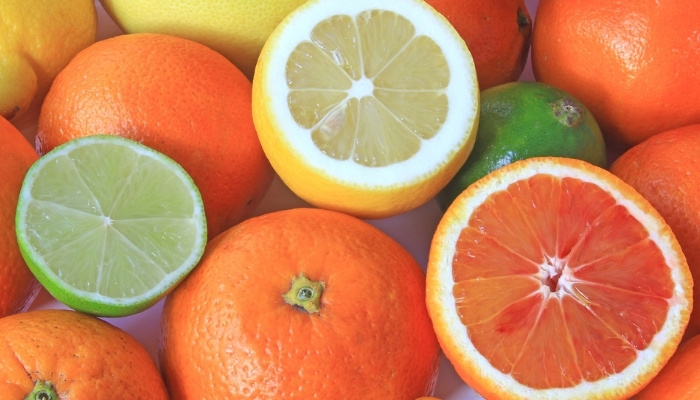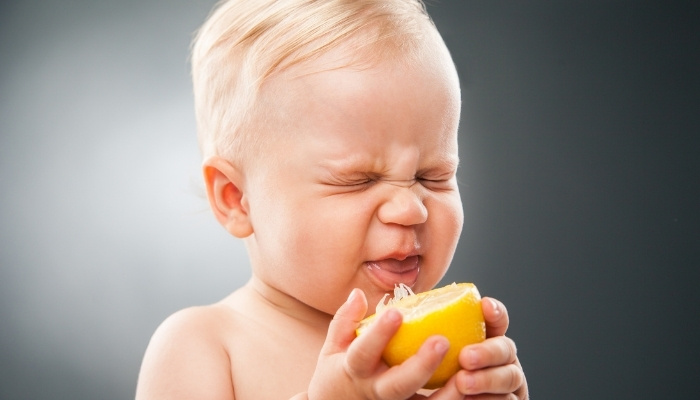Currently, there are a plethora of guidelines dictating what types of food are safe and appropriate for infants and how they should be introduced. Limitations include avoiding honey, citrus fruits, and cow’s milk until the child reaches one year of age. However, is it harmless to allow children a small taste of defiance?
When can a baby lick a lemon? Babies can lick lemons as soon as they’re able to eat solids. However, they cannot be given whole lemon slices to eat until they are over a year old. Too much acidity from citrus can cause stomach pains, skin rashes, diaper rashes, and painful urination for a baby under one year old.
Keep reading to learn more about citrus fruits, when a baby can have them, how to serve them, and what to avoid.
When To Offer Lemon to Your Baby
There are many reasons why you may want to feed lemon to your baby. Some women desire to develop their baby’s palette early to avoid picky eaters.
Other women may just need a good laugh at their baby’s reaction to sour tastes, but no woman wants to do either if it risks their baby’s health and well-being.
Benefits of Lemons for Babies
Lemons are full of Vitamin C, which has a handful of benefits for babies. It helps in iron absorption, boosts the immune system, and combats harmful free radicals.
In addition, some research supports lemon’s use as an antiviral in preventing and relieving cold and flu symptoms.
Possible Negative Effects
Unfortunately, lemons do carry effects that could negatively impact a baby. Lemons are highly acidic, so they may cause gastrointestinal issues, tooth decay, and reflux. Though rare, your child could also develop an allergy to citrus fruits.
When Is It Safe To Offer Your Baby a Taste of Lemon?
Babies 6 months of age or older can have small amounts of diluted lemon juice in their meals. This often is their first experience with sour foods.
A baby can taste real lemon at this age as well, so long as it is a tiny nibble and not the whole wedge or slice.
How To Introduce Lemon to Your Baby
If your child is between 6 months and 1 year old, you can introduce them to diluted lemon juice. You can incorporate this lemon juice at mealtimes as a food marinade.
If your child is older than 1 year, you can cut a small slice of lemon for them. Make sure to remove all seeds as they pose a choking hazard to young children.
Reactions To Expect
A baby’s reaction to lemon can range from salivating excitement to a scrunched face with tears streaming. It heavily depends on their tolerance to sour foods.
Some babies find citrus fruits delicious from the first taste while others struggle to come around. If it’s your baby’s first time experiencing citrus, you can likely expect a displeased reaction.
Which Citrus Fruits Are Best for Babies

Oranges, grapefruit, lemons, and limes all fall into the citrus category. Each one of these fruits provides extensive potential health benefits. For this reason, no one citrus fruit is better than the other.
However, children may be more inclined to eat better-tasting citrus fruits like oranges and grapefruits. Lemons and limes are less likely to be eaten directly, but they are great for cooking with.
When To Introduce Citrus to Baby
You can introduce diluted lemon and lime juice to your baby as early as 6 months. When your child masters the pincer grasp, they can begin to eat small quantities of citrus fruits. Larger portions should be saved for babies one year or older.
How To Serve Citrus to Baby
If you’re starting your baby on citrus early, remember one thing. Diluted lemon and lime juices are the only types of citrus juice that babies can have.
These should be served in small quantities and used to enhance the flavor of a meal or tenderize meat. Children who can successfully grasp food with their fingers may be able to eat cut-up portions of grapefruit and oranges.
If your baby is over one year old, they are more than likely safe to eat larger quantities of citrus fruits. These servings should be sliced into bite-sized pieces. Make sure that the seeds of any citrus fruits are removed.
Related Questions:
Can Toddlers Have Orange Juice?
Yes, toddlers can have orange juice but not until after one year of age. Even when they’re of age, orange juice is not the healthiest option out there. Despite having high quantities of Vitamin C, this juice often has high levels of sugar.
When Can Babies Have Mandarin Oranges?
Since mandarin oranges are a choking hazard, only babies that have mastered the pincer grasp can have them on their own. This usually occurs around 9 months old. For safety reasons, this food should be eaten in small portion sizes.
Final Thoughts
Babies can have small quantities of citrus when they start eating solid food around 6 months of age.
Due to the amount of acidity in most citrus fruits, whole slices of lemons should not be given until after a baby is one year old.
Too much acid from citrus fruits can cause your child harm. They may experience symptoms such as skin rash, diaper rash, painful urination, and stomach pains.
Charley is a mother of three with a passion for raising good humans. With her children in tow, she studies English and has made a career creating content about motherhood. In her free time, she enjoys traveling within the states to kayak, camp, and hike.

